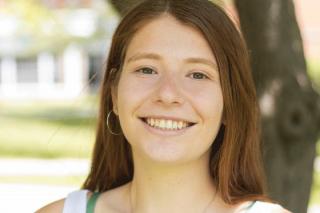“I always knew I wanted to study the environment,” says Samantha Margolin ’23, who studied Environmental Science and Computer Science at Simmons. “The course I took for my environmental science degree sparked my passion for plant biology and challenged me to think as a scientist. And I liked how [Computer Science] made me think abstractly. That perspective helped me in the lab, and in my current job.”
Localized Research
While at Simmons, Margolin conducted research on the Muddy River with Professor Anna Aguilera and Adjunct Professor Michael Berger, in collaboration with the Muddy Water Initiative and with funding from the Passionate Leaders Project.
As reported in the Fenway News (May 2023), “Margolin’s project explored whether excess phosphorus captured from the Muddy River could be put to good use as an alternative to commercial fertilizers. She transferred the phosphorus to phosphorus-poor soil from a farm to test whether it could enhance plant growth. Initial results show improved germination (an early stage in growth of a plant from a seed).” The results of the studies were presented at the 17th Annual Muddy River Symposium, where Margolin was given a poster award. “The work grew and evolved over two years,” says Margolin. “Every semester we thought, how do we answer this next question? It became more than a research project by the end, it became a passion project.”
During the summer before graduation, Margolin landed an internship at the Needham Community Farm, where she participated in a field study of how plants would grow in different concentrations of phosphorus absorbents. “Phosphorus is an essential nutrient for plant growth,” notes Margolin. “The idea was to release phosphorus in the soil and see if it will benefit or harm the plants, which are a good indicator of soil health.” She used the experience as the basis for her thesis, “Evaluating the Effectiveness of Post-Remediation Sorbents as Potential Amendments in Agricultural Soil.”
Margolin encourages students to try working in a lab at Simmons. “It’s so much more than any other school project you will experience,” she says. “Research is unique. You get to be the first person to try to ask and answer questions, and there is no limit to what you can do. At first it was intimidating, but I had so much support that I learned it was okay to make mistakes. We have a strong research community at Simmons. The faculty care so much about the research, and their students. I can’t recommend it enough.”
Leadership at Simmons
“Simmons made me a strong, confident leader in my current position,” says Margolin. “I feel really confident voicing my opinion. I think the small classes and opportunities for leadership roles are among the best things about Simmons.”
In addition to her internship and research experiences, Margolin cites her involvement in student organizations and Simmons Athletics as pivotal to building leadership skills. “I was the President of the Biology Liaison, and worked with a team of students and faculty to put on STEM-centered events. We hosted seminars, study workshops, and trips to the aquarium.” She was also a research assistant for the Biology Prep Room. “I worked with faculty in the Department of Biology to prepare the lab to code. I was behind the scenes in all the teaching labs, and that strengthened my confidence in the lab.”
As Captain of the Tennis team, Margolin learned essential time management skills. “I was very passionate about everything I was doing at Simmons. It was a lot to manage, but the faculty and coaches were so supportive.”
Working in the Lab
One year out from graduation, Margolin is a Research Technician at Massachusetts Eye and Ear, a different field from what she studied at Simmons. However, her studies prepared her for the challenge. “I wanted to try something unrelated to what I studied in undergrad, before applying to graduate school. In my current position I’m able to run experiments and look at the cell in a whole new way. I work with a mouse model [a laboratory mouse used to study an aspect of human physiology] and IPSC-Rential Pigment Epithelium to understand the progression of Aged Macular Degeneration and potential treatments,” says Margolin.
“My studies prepared me to work and think critically in the lab,” says Margolin. “At Simmons, I learned through engaging in research that I wanted to pursue a PhD after graduation. I wanted to work in an area of biology that would challenge me to develop a deeper understanding of cell and molecular biology.”
Thanks to her dual degrees, Margolin is able to process complex data sets and feel comfortable understanding scientific literature. “I have the confidence to run experiments and be excited in the lab, I learned that at Simmons.”

